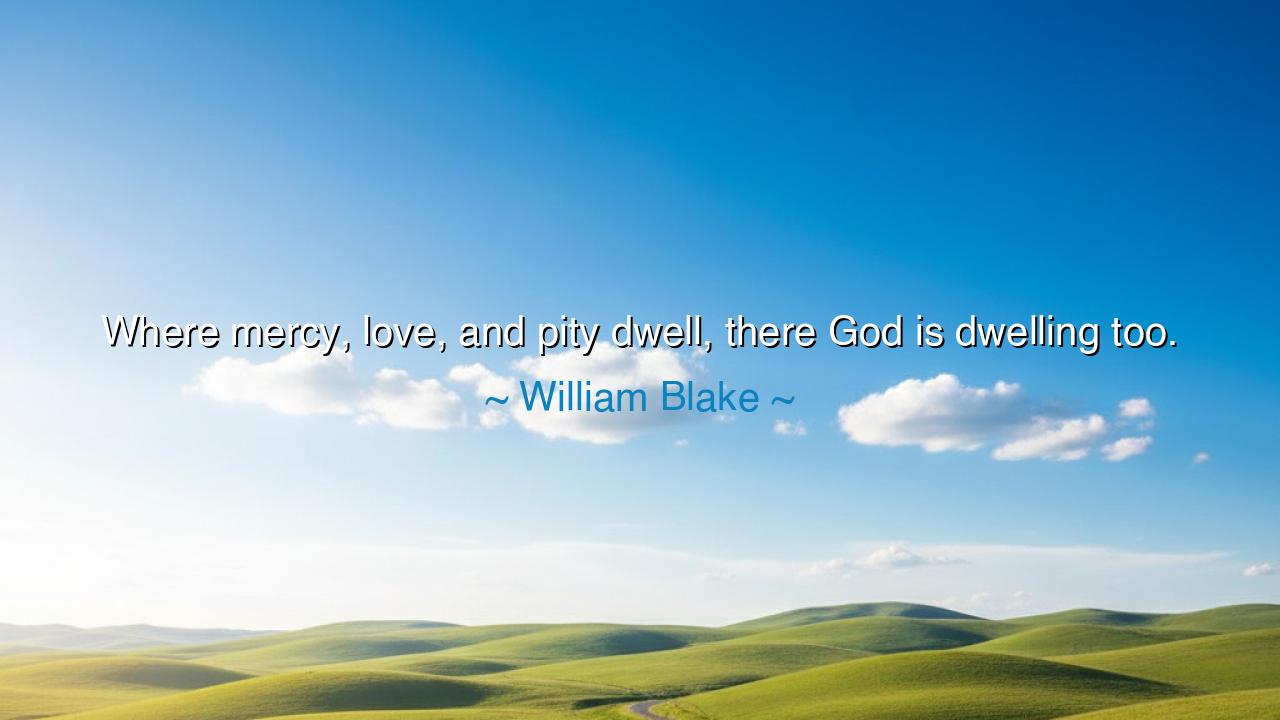
Where mercy, love, and pity dwell, there God is dwelling too.






"Where mercy, love, and pity dwell, there God is dwelling too." — These words of William Blake echo with the profound truth that the Divine is not confined to temples or altars but is most present where the qualities of mercy, love, and pity are made manifest in human hearts. Blake, a poet and visionary, understood that the presence of God is not just a matter of religious observance but is found in the actions of the heart — in the compassion we extend to others, in the love we offer without expecting return, and in the pity that drives us to alleviate the suffering of the world. In Blake’s view, God is alive in the very acts of kindness that flow from the depths of the human spirit.
The ancients, too, understood that the Divine is found not in the pomp of ritual but in the humble actions of the soul. Plato, in his dialogues, spoke often of the ideal philosopher-king — a ruler who governs not with power or fear but with wisdom, compassion, and a deep sense of justice. To live in harmony with the Divine was to live a life marked by love, mercy, and selflessness. Similarly, the Stoics, such as Marcus Aurelius and Epictetus, believed that virtue — which includes mercy, love, and pity — is the highest calling of man, for it aligns the human soul with the cosmic order and with God's will. The virtues of compassion and love were seen as ways of living in accordance with the Divine, for only through such virtues can one attain true peace and fulfillment.
Consider the story of Mother Teresa, who lived out this very truth. Her life, devoted to serving the poorest and the sickest, was marked by deep mercy and love for the suffering, reflecting the presence of God in every action she took. Her work was not grand or spectacular by worldly standards, but it was filled with the highest form of compassion: a love that saw the face of God in every human soul, no matter how broken or destitute. Mother Teresa understood that God dwells not in the palaces of the rich or in the hallowed halls of churches but in the hearts of those who serve with love, mercy, and pity for those in need. Her work was a living testament to Blake’s words — that in every act of selfless service, the Divine is near.
Jesus Christ, too, taught that the presence of God is found in the mercy and love we show to others. His life and ministry were centered around acts of compassion — from healing the sick to forgiving those who wronged Him. In the Sermon on the Mount, He spoke of loving our enemies and blessing those who curse us, elevating mercy to the highest of virtues. His parable of the Good Samaritan teaches us that true neighborly love is found not in religious observance, but in extending mercy and pity to those who are suffering, regardless of their status or background. For Jesus, the very presence of God was made manifest in the love and compassion extended to others, and He showed us that by living out these virtues, we bring God’s kingdom to earth.
This teaching of Blake’s resonates deeply with the wisdom found in ancient religious texts. The Hebrew Scriptures, particularly in the book of Micah, instruct humanity to “act justly, to love mercy, and to walk humbly with God.” These words mirror the idea that to align oneself with the Divine is to embody the virtues of mercy, love, and pity in every aspect of life. It is not enough to worship or pray; true devotion is shown in how we treat one another, in how we respond to the suffering of the world, and in how we extend compassion and mercy to those in need. The Divine presence is not abstract; it is alive and real in the lives of those who seek to bring healing and peace to a broken world.
The lesson in Blake's quote is one of deep humility and purpose: that we are called to make mercy, love, and pity the foundation of our lives, for in doing so, we invite God’s presence into our hearts and into the world. It is not enough to speak of faith; we must live it through action. These virtues are the very manifestation of the Divine in the world. When we show mercy, we align ourselves with the compassionate heart of God; when we show love, we reflect the sacrificial love of Christ; and when we show pity, we connect to the deep empathy that Jesus exemplified when He wept over the suffering of His people. These are not merely good deeds; they are the way in which we embody God's presence.
So, let us live with the awareness that God’s presence is made manifest in the acts of mercy and love we offer to others. Let us not wait for grand moments of spiritual enlightenment, but let us recognize that in every moment of kindness, every act of pity, and every gesture of love, we are inviting God to dwell among us. We are called not only to pray for the presence of God, but to live in such a way that God’s love and mercy are visibly present in the world. In doing so, we do not only bring heaven to earth, but we fulfill the deepest purpose of our existence — to live as instruments of God’s love.






AAdministratorAdministrator
Welcome, honored guests. Please leave a comment, we will respond soon